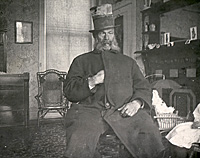Charles Forbes watched Tad on occasion, acted as footman to the presidential carriage, and was driving Mrs. Lincoln from the Soldiers’ Home to the White House on July 3, 1863 when either an accident or sabotage caused her carriage to break apart. In the process, Mrs. Lincoln’s head was badly hurt and she spent weeks recovering. He was on the presidential carriage on the night of April 14, 1865, acting as a messenger and checking on the presidential party during the evening. He and guard John Parker went to a nearby bar to have drink during the intermission at Ford’s Theater.
Assassination scholar Michael Kauffman wrote that “Abraham Lincoln had no bodyguards in the modern sense. It was the messenger Charles Fores who had allowed Booth into the box, and consequently Mrs. Lincoln held Forbes responsible for the president’s death. To deflect the blame, Forbes filed a formal complaint against a White House guard, patrolman John F. Parker, and charged him with leaving his post outside the president’s box to have a drink. Parker was tried and acquitted.”1
One of the President’s secretaries later recalled: “On the morning of the 2d of February, 1865, between nine and ten o’clock, as I was ascending the stairs to the second story, to reach my room, I met Forbes, an intelligent servant, descending with a small valise in his hand, and I asked, ‘Where are you going?’ Looking up to see no one was near, he whispered, ‘Fortress Monroe,’ and hurried on. When I reached the upper hall I met the President with his overcoat, and going to my room, looked out of the window, and saw him quietly walking around the curved pavement which leads to Pennsylvania Avenue, while Forbes was following, at a distance of two or three hundred feet, as his valet. Waiting for some time, I then crossed the hall to the room of the principal secretary, Mr. John G. Nicolay, and quietly said: ‘The President has left the city.’ ‘What do you mean?’ he asked; and I replied: ‘Just what I have said.’ Rising quickly, he opened the door which communicated with the President’s room, and was astonished to find the chair of Mr. Lincoln vacant. The President had received a despatch which convinced him that it was proper to go to Fortress Monroe and confer with the rebel commissioners, Alexander Stephens, R. M. T. Hunter, and J.A. Campbell, and at nine o’clock that morning sent the following telegram to Secretary Seward, already there: ‘Induced by a despatch from General Grant, I join you at Fortress Monroe.'” 2
Tom Pendel told a story about Forbes’ Irish ancestry and the President’s sense of humor. Driving near the Soldiers Home, Mr. Lincoln asked Forbes: “‘What kind of fruit do you have in Ireland, Charles?’ To which Charles replied, “Mr. President, we have a good many kinds of fruit – gooseberries, pears, apples, and the like.’ The President then asked, ‘Have you tasted any of our American fruits?’ Charles said he had not, and the President told Burke the coachman, to drive under a persimmon tree by the roadside. Standing up in the open carriage, he pulled off some of the green fruit, giving some of it to Burke and some of it to Charles, with the advice that the latter try some of it. Charles, taking some of the green fruit in his hand, commenced to eat, when to his astonishment, he found that he could hardly open his mouth. Trying his best to spit it out, he yelled, ‘Mr. President, I am poisoned! I am poisoned!’ Mrs. Lincoln fairly fell back in his carriage and rolled with laughter.”3
Footnotes
- Michael W. Kauffman, American Brutus: John Wilkes Booth and the Lincoln Conspiracies, p. 393.
- Rufus Rockwell Wilson, editor, Intimate Memories of Lincoln, p. 600.
- Thomas Pendel, Thirty-Six Years in the White House, pp. 32-33.
Visit
Mary Todd Lincoln
John Parker
Ford’s Theater
Soldiers’ Home
John Parker
Thomas Pendel
Abraham Lincoln and Peace
Hampton Roads Conference








